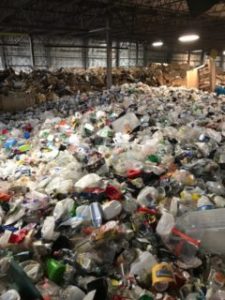Plastic is like trees: it’s everywhere, and you know it when you see it, but you probably can’t explain the difference between types. And why would you be able to? Life is complicated enough without having to commit to memory the ways that HDPE differs from LDPE; unless, of course, you work in the plastics recycling industry.
At Miller Recycling, plastic is one of the materials we receive and process. It’s also the most complicated material to recycle, in part because consumers don’t know what types can be disposed of and in which ways.

A product made of plastic is often stamped with a resin code, which is a number between one and seven inside a small triangle made of arrows. The presence of a resin code doesn’t necessarily mean that the product can be recycled. It’s the number inside the triangle that counts, because each number corresponds to a different type of plastic.
1: PET or PETE (Polyethylene terephthalate)
There’s a good chance you’ve held something made of this plastic type today. PET or PETE is what’s used to make bottles for soda, water and other drinks. It’s also used to make cooking oil containers, plastic peanut butter jars and containers for other popular food items.
PET/PETE products CAN be recycled.
2: HDPE (High density polyethylene)
HDPE plastics are also extremely common. They’re those used to make milk jugs, shampoo bottles, cleaning product containers and detergent bottles.
HDPE products CAN be recycled.
3: PVC (Polyvinyl chloride)
PVC is a soft, flexible plastic, so it’s used for a huge array of household products. Plastic tubing, kids’ toys, plastic trays and furniture are often made out of PVC.
PVC products CANNOT be recycled.
4: LDPE (Low density polyethylene)
A lot of plastic wrappings are made of LDPE plastic. It’s also used to make grocery bags and the bags that hold newspapers, sliced bread loaves and fresh produce, among other things.
LDPE products CAN SOMETIMES be recycled.
5: PP (Polypropylene)
PP is used to make the food containers used for products like yogurt, sour cream and margarine. It’s also made into straws, rope, carpet and bottle caps.
PP products CAN SOMETIMES be recycled.
6: PS (Polystyrene)
Styrofoam products are made out of PS plastic, so it’s commonly used to make disposable coffee cups, packing peanuts, coolers and to-go food containers.
PS products CAN SOMETIMES be recycled.
7: Other
Any type of plastic that doesn’t fit into one of the first six categories falls under this heading. Products stamped with a 7 are often made out of multiple plastic types or out of other types of plastic that can’t easily be recycled.
#7 products CAN SOMETIMES be recycled.
More on Plastics Recycling…
Just because a plastic type can be recycled doesn’t mean your local municipality wants you to put it into your recycling bin for collection. It’s not viable for some plastics recycling companies to take hard-to-process plastic products like Styrofoam. Bags made of type 4 plastic, like produce and grocery bags, also shouldn’t be put into recycling bins because they can get tangled in the equipment at recycling facilities. Grocery stores collect these bags for proper plastics recycling.
Both individuals and businesses should also bear in mind that here in Massachusetts, the statewide waste ban prohibits the disposal of any single resin narrow-necked bottles (aka, soda bottles) in trash bins. Recycling these containers isn’t just an option: it’s the law.
So what does all of that mean for you? A few things:
- Types 1 and 2 plastics may be tossed into standard recycling bins.
- Other plastic types may not be permitted in your bin, depending on your municipality’s guidelines.
- Hard-to-recycle plastics – including Styrofoam, shrink wrap and manufacturing scrap – require specialized handling.
Trust your plastics recycling questions to Miller Recycling. Our team can help your business establish an efficient and cost-effective system for recycling plastics, and we pay competitively for large quantities of plastics including hard-to-recycle varieties.
We know that plastics recycling can be confusing. We can provide guidance and solutions to all your plastics needs. As always, contact us with questions.

